Natural Remedies to
keep you strong and healthy throughout the Summer

Summer is the nicest time of the year for many of us. We can finally get rid of sweaters and jackets, take off those socks, put our feet in some light sandals and show them to the sun. But not all people can tolerate the heat of the summer equally well.Why is that, and what gentle methods can help?
Summer – for people suffering from rheumatic joint complaints it generally means a time of improvement. And for those who are
susceptible to colds, it has a therapeutic effect on the paranasal sinuses and bronchial tubes. But more than a few react to the heat with circulation issues, fatigue and exhaustion. With heavy, painful legs or shortness of breath after exercise. The reason is not so much the heat, but more so the climate. Because extreme changes in temperature and barometric pressure are not unusual. One day it’s wet and cool and a few days later it’s hot outside like a furnace. It is not easy for the organism to deal with rapidly rising temperatures from 15 to 30 degrees within such a short period of time. Particularly older people have a hard time with this. And then there’s the high humidity which, unlike dry heat, can put additional stress on the cardiovascular system.
Boosting the Cardiovascular System
Circulatory disorders are generally characterized by falling, low blood pressure, which is also called orthostatic dysregulation. It
can come with dizziness, flickering before the eyes, cold sweats and palpitations. A brief period of unconsciousness is also possible if the blood pressure is extremely low. Blood pools in the legs and no longer supplies the brain with sufficient oxygen, which can lead to the symptoms described above.
By increasing the frequency of beats, the heart tries to counteract the slowing down of the blood flow resp. the insufficient pressure
in the vessels. It is important to take the first warning signs seriously. Whenever possible, lie down and elevate your legs. This simple measure alone often helps to ease the complaints.
Camphor helps with Circulation and Memory
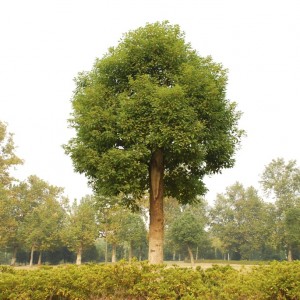
Back in the old times already, this substance from the bark of the Chinese camphor tree was used as an ingredient in the smelling bottles of fine ladies – it helped to awaken them quickly from a fainting fit!
For symptoms of circulatory disorders due to low blood pressure, camphor is a tried and true home remedy.
Studies have been underway for several years to examine the relationship between cardiovascular and mental processes. While one group of participants with low blood pressure was given a camphor-containing cardiovascular remedy, the other took placebo. Their mental performance was measured before and after taking the remedy.
Strikingly, the camphor-containing remedy started working already one to two minutes after ingestion. After this short time, a marked improvement in concentration, short-term memory and hand eye coordination could be noted. These effects became more pronounced as blood pressure increased due to the remedy. It was possible to confirm the invigorating effect of camphor, which has been known for centuries, through quantitative, physiological and psychological measuring devices.
Rosemary Oil activates Blood Pressure
In Aromatherapy, rosemary is deemed to be the strongest stimulating essential oil and is therefore very useful for increasing low blood pressure. Even so called “morning grouches” who have extreme difficulties can start the day better with rosemary. Add a few drops of the oil mixed with cream as an emulsifier to your wash basin and you will feel its stimulating effect. Rosemary also has a cardio tonic effect and is a classical ingredient in many heart preparations.
Heart Wine Cardia
Recipe
Put a cup of freshly cut hawthorn (Crataegus) leaves and a cup of freshly cut bergamot, alternatively lemon balm, into a wide neck bottle and fill it up with one liter of red wine. Seal it well and let it seep for three weeks, then strain it.
Then stir two drops each of rosemary oil and hyssop oil into two tablespoons of honey and dissolve the mixture in the wine concoction. Let it seep for another two weeks. Take a shot glass full per day.
Kneipp Water Gushes mobilize Circulation
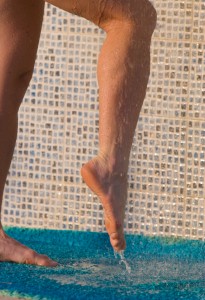 Father Kneipp knew: Water, being a provider of temperature stimulus, can evoke therapeutic
Father Kneipp knew: Water, being a provider of temperature stimulus, can evoke therapeutic
reactions in the blood vessels, the muscular system and the metabolism. Used this way, it helps with improving circulation, detoxification and relaxation. Repeated and regular applications have a training effect on the cardiovascular system and strengthen the body.
Kneippism includes more than a hundred different varieties by now, such as affusions, baths, ablutions, wraps and packages. Used regularly, they have a training effect. Susceptibility to infection is decreased and general wellbeing is increased. Therefore, if you mobilize your
circulation with regular Kneipp affusions now and keep the habit up in the colder season, you will benefit greatly. Colds and flus will become rarer or symptoms will be less severe.
This is how you do it: First, be sure to use a tub or a shower mat to avoid slipping. For a typical Kneipp affusion, the shower head
should be removed. Start with a warm application of about 36 – 38 deg. C. You may need to verify the correct temperature with a thermometer the first few times, but it will not take long before you’ll be able to gauge the temperature quite well.
Start with the right leg: Guide the water jet along the outer side and back side of your calf and thigh up to your buttocks. The move
the shower hose downwards again along the inner side of the leg down to the foot. Repeat this water application on your left leg.
Now decrease the temperature of the water. It should be a cool 16 – 18 deg. C. Repeat the application. Be mindful of one difference: While it is all right to take your time with the warm affusions, the cold water application should be done quickly. It is important that you avoid getting chilled.
The warm and cold water affusions can be repeated according to your preference, however, the last affusion should be a cold water
application. This kneippism has a strengthening effect on the vascular system and can permanently stabilize a labile cardiovascular system.
Homeopathy for Circulatory Complaints
Homeopathic remedies are natural, safe and effective. Of course, your constitutional remedy (read more under “About Classical
Homeopathy”) will always work best, but there are also symptom specific remedies that have been found to be very effective in many cases:
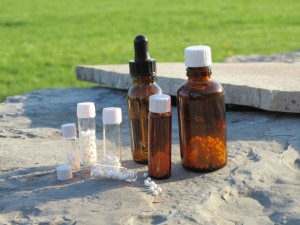
Gelsemium: for circulatory issues accompanied by headache, palpitations and a dazed feeling
Rhododendron: for sensitivity to changes in the weather accompanied by rheumatic pains, or
Bryonia: for malaise, especially from warm and humid, tropical weather
If none of the remedies listed suits your individual complaints, do come in for a consultation and we will select an appropriate
homeopathic medicine that matches your unique set of symptoms. With over 4,000 remedies to choose from, it is best to call us at (519) 603-0505.
Heavy legs – when your veins are on strike
In the hot summer months, signs of venous insufficiency can be seen as well. While there are often no complaints whatsoever in the cooler season, the summer can bring with it symptoms like pain, restless legs, itchiness, edemas, and nightly cramps in the calves in particular. The reason for this is that extreme heat and humidity can further expand already weakened veins.
Venous insufficiency is often a hereditary connective tissue weakness which gets progressively worse as we age. In general, veins have one-way valves that allow blood to travel in only one direction – towards the heart. If the valves are functioning properly, any tendency toward back-flow (away from the heart) immediately pushes the vein’s valve leaflets (flaps) closed. The movement of venous blood is passive.
Unlike the arterial system which actively pumps blood to all the cells of the body, venous blood returns to the heart primarily due to the contraction of muscles and inspiratory (breathing) movement, literally squeezing venous blood back to the heart. One of the most important muscle pumps is the calf muscle pump. Physiologically, with every movement and every step the leg muscles contract and relax. The vessels become narrower (constrict) when the muscle contracts and widen (dilate) when the muscle
relaxes. In other words, because the veins located in between the muscles constrict, they can pump the blood up towards the heart. This is called the venous pump. On the other hand, if your veins are dilated because of the connective tissue weakness mentioned above, then the venous valves do not close properly any longer. Transportation of the blood to the heart slows down, or the blood can pool in the legs. This leads to increased pressure in the veins, which means that the veins which are already dilated are widened even more.
In addition, the extra pressure in the veins can lead to increased permeability of the blood vessels, causing fluid to leak out into the
surrounding tissue. Moderate venous weakness affects primarily the lower part of the legs: feet and ankles swell up. Legs become heavy and achy. Other symptoms pointing to venous insufficiency include itching, discoloration of the skin, restless legs or nightly cramps in the calves, but also the formation of spider veins and varicose veins.
How you can help yourself
If you have low grade venous insufficiency that bothers you
only in the summer, the following may give you relief:
- Elevate your legs as often as possible.
- Exercise regularly. Use the stairs instead of the elevator – this trains the musculature of your legs and supports your veins.
- If you need to sit or stand for longer periods of time, make sure you get in some suitable exercises regularly. For example, if you are sitting in an office, you can alternatively lift and lower the tips of your feet. A good exercise to do at home is “biking while lying on your back”.
- Kneippism.
- Your feet should roll over well from heel to toes, therefore, wear flat heels more often.
- Avoid extensive sunbaths.
- If you are overweight, try to lose some weight to relieve your legs.
- Avoid alcohol as it dilates the veins.
- Cooling creams and gels with plant extracts such as Arnica, Buckeye, Hamamelis and Vine leaves in combination with Heparin have a relaxing, soothing effect.
Tissue salts: In particular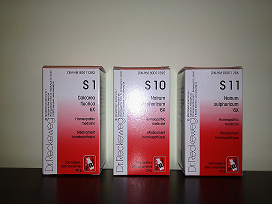 the salts # 1 Calcium Fluoratum, # 10 Natrium sulfuricum and # 11 Silicea have a supportive effect on venous insufficiency.
the salts # 1 Calcium Fluoratum, # 10 Natrium sulfuricum and # 11 Silicea have a supportive effect on venous insufficiency.
# 1 Calcium Fluoratum is also referred to as the salt of the connective tissue, the joints and the skin as it strengthens the supporting tissue and gives it firmness.
# 10 Natrium sulfuricum is a biochemical channeling remedy and furthermore helps the body to discharge excess water.
# 11 Silicea strengthens all connective tissues and has a particularly positive effect on the skin, hair and nails.
The tissue salts #1, 10 and 11 have proven to be very effective for venous weakness.
All tissue salts are available at our clinic! So come in and pick up yours today!
Support stockings: There are support stockings on the market today that look no different than pantyhose, so no woman needs to fear their looks. If the complaints are more severe, then compression stockings should be worn. Here too, there are products available that look acceptable.
If your venous insufficiency is more of a moderate to severe nature, then I would strongly suggest you come in for a homeopathic constitutional consultation. In it, we address all aspects of your health – physical, mental and emotional – because how you think and how you feel affects you at the physical level too. Your constitutional remedy will always work the best, because it is completely individualized to your particular set of symptoms. You will not find another medicine that individualizes its medicines
like homeopathy does. Call us at (519) 603-0505 to book an appointment.
Thrombosis– Complication from Venous Ailments
Not to be confused with venous insufficiency is thrombosis. This is a coagulum (thrombus) that can develop from a blood clot. If the thrombus gets too big, it clogs the blood vessel. This leads to interference of the blood circulation and blood stasis before occlusion results.
The most common symptoms of a thrombosis are sudden one-sided swellings of the leg, an unspecified feeling of tension or pain which feels like sore muscles. The calf is often sensitive to pressure, the sole of the foot hurts upon stepping or applying pressure to it.
If you experience these symptoms, please consult your doctor immediately, as the thrombus could break away and travel to the
arteries of the lungs, which results in pulmonary embolism. Depending on the extent and size of the thrombus, it could take a life-threatening course.
When your Heart goes out of Rhythm
People with weak cardiac output suffer in particular with the heat. The reason being, as already explained, that the blood vessels dilate in the heat. As a result, there is less pressure in the arteries and the heart needs to work harder to pump the blood through the body. While a person with a healthy heart can deal with this compensation relatively well, if the heart is weakened, then this leads to more or less pronounced symptoms such as shortness of breath, swollen legs and circulation problems.
However, also those who don’t have a weak cardiac output – but are intolerant to the heat instead – may experience such problems on hot days. The problems are less serious here because the organism can compensate for them on its own.
If cardiac output starts to weaken at an advanced age, this is referred to as a senile heart. It is therefore no wonder that many older
people feel very unwell on dog days and may get into life-threatening conditions in the worst case scenario. It is therefore important to observe the body’s warning signs in time and act accordingly.
A simple but effective advice: Older people with these types of problems should generally reschedule running their errands or taking part in sports on hot days to the early morning hours resp. the evening hours, in order not to overstress the cardiovascular system.
Getting through the Hot Season
- Drink enough
If you sweat a lot, then you also need to drink a lot. Generally, the body has a sophisticated regulatory system which sends alarm
signals that incite us to take in fluids in time. However, as we age, there is a possibility that this warning system does not work as well anymore. People with a pronounced weak heart are often advised by their doctors to limit the amount they drink in order to avoid fluid retention. But even in these cases the amount of fluid intake should be increased slightly on hot days. It is best
to consult your doctor by how much.
- Choose the right drink
When you are sweating, you lose large amounts of salt, magnesium and other minerals, resp. electrolytes through your skin. But the body needs them urgently and therefore they need to be replenished. The ideal thirst quencher for the hot days: mineral water. If you mix it 1:1 or 1:2 with fruit juice you get a refreshing spritzer which would be a good replacement for the sweet lemonades so popular with kids.
But the drinks should under no circumstances be too cold, especially if you drink them fast. Because the short-term “cold shock” and the cooling of the body that comes with it may stimulate heat production. This way, the next sweating attack is bound to occur!
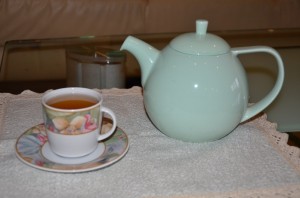
It is not for no reason that in hot countries, also as a sign of hospitality, warm tea is offered. When drinking this, the body is likely to break out in a sweat too, but only moderately. Sweat will evaporate off the skin and take some of the thermal energy that is distributed there with it when it goes, thus cooling the body without straining the circulation.
- No alcohol before four
Alcohol can have very negative effects when taken during the heat. It further dilates the blood vessels which are already widened due to the heat and in the end, the heart has to work even harder in order to circulate the sagging blood. In the summer, alcohol should be consumed only in the evening when it is cooler and the drinks should light, such as coolers, spritzers or light beer.
- Diet
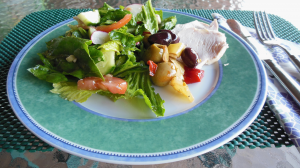
Generally, the body adjusts to the seasons and automatically prefers light food in the summer. Yet, there are people who will eat chilli or roast and potatoes when it is 35 degrees in the shade! Typically, a person’s energy level sinks after such a heavy meal because the digestive organs need to work really hard to process the high calorie food.
A light diet consisting of fresh ingredients relieves the digestive system and circulation
A heavy meal also requires more blood than a light meal, blood which is now missing from the vessels of the skin to regulate the heat.
One diet which is tolerated particularly well on hot summer days is the Mediterranean diet with poultry, fish, vegetables and
fresh fruit. Also, a broth containing salt will replenish the sodium requirements.
- Sports – what to watch out for in the
summer
It is not unusual to see joggers who don’t want to forego their training stint, outside in the heat. Here too, the rule is to move such
activities to the early morning hours or the evening, even if your constitution is robust. The ozone concentration is generally higher on these days and this will contribute in part to the massive strain that exercise can put on your body.
- Careful, medication!
In the heat of the summer, you may experience side effects and symptoms of intolerance to some medications. There are substances whose active ingredients sensitize the skin to the sun’s rays and make it sensitive to light. With heavy exposure to the sun it can lead to massive redness, even blistering. These substances include for example the ingredient Amiodarone which is prescribed for cardiac arrhythmias, the antibiotic Doxycycline used for bacterial infections such as pneumonia and urinary tract infections, and
also St. John’s Wort which is used for depression. If you are on any one of these medications and you are going to be outside for a longer period of time, make sure to use a sunscreen with a high sun protection factor (SPF) and/or wear a sun hat or cap.
I hope that you found these hints helpful and wish you a great and of course, healthy, summer. If you have any questions or concerns about this article, your personal symptoms or complaints, or about homeopathy in general, I invite you to call me or come in for a complimentary information session.
Irene Schwens, C.Tran., DHMHS
Homeopath








